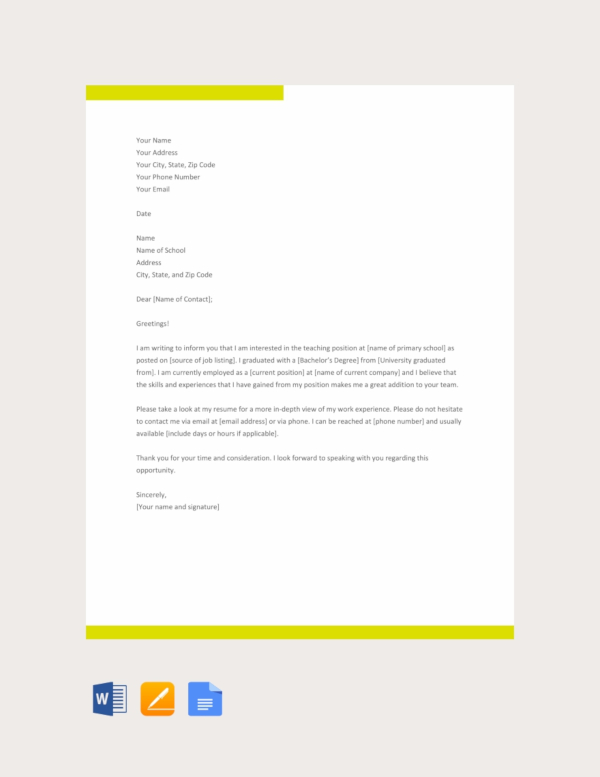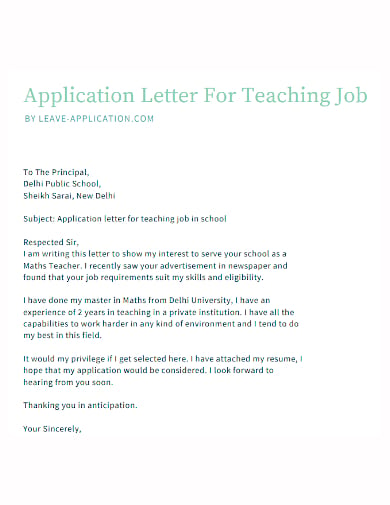To apply for teaching jobs in private schools, submit a tailored resume and cover letter directly to the school. Follow up with a personal email or phone call to express your interest.
Entering the world of education as a teacher in private schools requires a strategic application approach that sets you apart. Crafting a standout resume and engaging cover letter tailored to each private school’s vision and needs is crucial. Navigating the job market in the educational sector involves understanding the unique cultures and expectations of private institutions. [Apply for Teaching Jobs in Private Schools]
Prospective teachers must showcase their qualifications, relevant experience, and passion for teaching in a way that resonates with private school hiring committees. Building a strong professional network and maintaining a proactive communication strategy can increase your visibility and chances of securing a teaching position in these competitive environments.
How to Apply for Teaching Jobs in Private Schools
The Private School Landscape
Embarking on a teaching career within the private school sector offers a variety of opportunities. Each school possesses its unique culture, ethos, and approach to education. Recognize the diversity and preferences before applying to align your career with the right institution.
Varieties Of Private Schools
Private schools come in many shapes and sizes, each with its distinct focus:
- Religious Affiliation Schools: These emphasize religious studies along with academic subjects.
- Montessori and Waldorf Schools: They offer alternative, student-centered learning approaches.
- Preparatory Schools: They aim to prepare students with a rigorous curriculum for higher education.
- Special Needs Schools: Tailored support and resources for diverse learning requirements are provided.
- International Schools: These offer International Baccalaureate and globally recognized programs.
Typical Hiring Seasons
Different schools may have varied timelines for hiring new teachers. Stay informed and prepare ahead. [Apply for Teaching Jobs in Private Schools]
| Season | Hiring Activity |
|---|---|
| Winter | Schools start posting openings for the next academic year. |
| Spring | Active hiring takes place; the ideal time to apply. |
| Summer | Last-minute hires due to unexpected vacancies. |
| Fall | Less common; occasional mid-year openings. |
Align your job search and application submissions with these seasons for the best chances of success.

Credit: www.pinterest.com
Crafting A Standout Resume
A well-crafted resume opens doors to exciting teaching opportunities in private schools. Your resume is your first impression. It must shine. It’s your marketing tool. To secure that interview, a tailored and skill-focused resume is crucial. [Apply for Teaching Jobs in Private Schools]
Tailoring Your Experience
Tailoring your teaching resume means aligning your experience with the job’s needs. Start with your most recent teaching roles. Note down the specifics that the school emphasizes. Match these with your past experiences.
- Identify the keywords in the job listing.
- Match your past roles with those keywords.
- Include quantifiable achievements to demonstrate impact.
For instance, if a school focuses on technology use in classrooms, highlight your experience in that area: [Apply for Teaching Jobs in Private Schools]
| Year | Role | Tech Experience |
|---|---|---|
| 2021 | Math Teacher | Implemented tablet-based learning in Algebra classes. |
Highlighting Relevant Skills
Skills in teaching go beyond the classroom. Present those talents schools are seeking. Focus on what sets you apart.
Core skills you might include: [Apply for Teaching Jobs in Private Schools]
- Classroom management
- Curriculum development
- Mastery of educational technology
Soft skills could involve:
- Strong communication
- Critical thinking
- Adaptability
Be sure to:
- Present real-world examples of these skills in action.
- Use action verbs that engage the reader.
- Keep it concise and to the point.
Cover Letter Essentials
When you aim to secure a teaching position in a private school, your cover letter is crucial. This document gives your future employer a glimpse of who you are. It highlights your passion and readiness for the classroom. Let’s delve into some cover letter essentials.
Capturing The School’s Ethos
A successful cover letter reflects the unique character of the school. Research the school’s values and integrate them into your writing. Mention specific programs or initiatives that excite you. Show the hiring committee that you belong in their community.
Showcasing Your Teaching Philosophy
Your teaching philosophy is a core part of your professional identity. Convey your educational beliefs and strategies. Share examples of how you applied these beliefs in past roles. Remember to be concise and authentic. This makes your application stand out.
Key elements to remember: [Apply for Teaching Jobs in Private Schools]
- Personalize your letter for each application.
- Evidence of achievements supports your claims.
- A professional tone shows respect for the institution.
- Careful formatting and proofreading are non-negotiable.
Gathering Strong References
As you dive into the world of job applications for private teaching positions, gathering strong references is a crucial step. These recommendations provide a glimpse into your professional abilities and character. They can influence the hiring decision greatly. Select the right advocates, and present their testimonials with appropriate etiquette for maximum impact.
Choosing The Right Advocates
Finding the ideal individuals who can vouch for your teaching skills and personal qualities is essential. Think of past supervisors, colleagues, or academic mentors who know your work ethic and have seen you thrive in educational environments. Your references should be:
- Professional: Prefer past employers or colleagues over friends or family.
- Reliable: Choose individuals who are respectful and will respond promptly to inquiries.
- Knowledgeable: They should be well-versed in your teaching experiences and skills.
Reference Etiquette
Once you’ve identified your references, proper etiquette is imperative. Ensure they are willing to support your application before listing them. Provide them with: [Apply for Teaching Jobs in Private Schools]
- A heads-up: Let them know they might receive a call or email.
- Your resume: Share your current resume so they can align their recommendation with your experience.
- Details about the job: This allows them to tailor their reference to the position.
Make sure to thank them for their help, and keep them informed about the progress of your application. [Apply for Teaching Jobs in Private Schools]
Effective Networking Strategies
Effective Networking Strategies play a crucial role in landing a teaching job in private schools. This approach goes beyond submitting resumes. It involves creating connections and making an impression before the interview. Implement proactive networking tactics to stand out. In this guide, we delve into how to harness your existing relationships and build new ones through alumni associations and educational conferences.
Using Alumni Associations
Alumni associations are gold mines for networking opportunities. They comprise former students poised to offer guidance and endorse your candidature. Here’s how you can leverage these associations: [Apply for Teaching Jobs in Private Schools]
- Reconnect with your institution through alumni events and newsletters.
- Participate in alumni mixers and career workshops to meet peers.
- Create a presence on your alumni online forums or social platforms.
- Ask for introductions to alumni working in education.
- Seek mentorship from experienced alumni educators.
Engaging In Educational Conferences
Educational conferences are where thought leaders and innovators convene. Attending these can boost your professional network. Below are strategies to make the most of these events:
- Research and attend relevant education conferences.
- Prepare a brief pitch about your teaching philosophy and goals.
- Exchange business cards or contact details with attendees.
- Join or lead conference breakout sessions for visibility.
- Follow up with new connections via email or LinkedIn.
Consistent engagement in these environments elevates your chances of securing teaching roles. Create a strategy for networking that aligns with your career aspirations.

Credit: www.nordangliaeducation.com
Ace The Interview
You’ve polished your resume and landed an interview at a private school. Now, it’s showtime. Standing out in a teaching job interview means being prepared, professional, and passionate. Your goal is to convince the hiring committee you’re the best fit for their school. Use these strategies to make a lasting impression. [Apply for Teaching Jobs in Private Schools]
Common Interview Questions
Interviewers often start with familiar questions to gauge your experience and teaching philosophy. Prepare concise, bold answers for these:
- Why do you want to teach at this school?
- What teaching strategies do you prefer?
- How do you assess student learning?
- Describe a challenging teaching moment and how you handled it.
Expect situational questions too. They reveal how you handle real classroom events. Develop clear, practical responses to common scenarios.
Demonstrating Classroom Management
Top schools seek teachers who can maintain a productive learning environment. Share examples from past experiences. Highlight your skills in: [Apply for Teaching Jobs in Private Schools]
- Establishing clear rules and procedures
- Building a Respectful Classroom Community
- Implementing effective discipline techniques
- Adapting to diverse student needs
Create a brief, impactful story for each point. Relate how these strategies helped your students. This shows practical knowledge and success in classroom management.
Demo Lesson Preparation
Demo Lesson Preparation is a pivotal stage in the application process for teaching jobs in private schools. This practical demonstration allows potential employers to witness your teaching style and interaction with students first-hand. Therefore, crafting an effective and attention-grabbing lesson is essential. Read on to learn how to plan an engaging lesson and embrace feedback effectively.
Planning An Engaging Lesson
Your goal is to captivate both students and evaluators with your teaching prowess. To achieve this:
- Identify clear objectives: Your lesson must have specific, achievable goals.
- Incorporate various teaching methods: Use storytelling, discussions, and activities to keep students interested.
- Utilize teaching aids: Visual aids, props, or tech can make concepts clearer and more memorable.
- Prepare for different learning styles: Address auditory, visual, and kinesthetic learners.
- Time management: Keep your lesson paced well, allowing time for student engagement and questions.
Additionally, anticipate potential challenges you might face. This preparation shows flexibility and problem-solving skills valuable in classroom settings.
Receiving Constructive Feedback
After the demo lesson, feedback will be invaluable. Remember the following:
- Listen actively: Show that you value the opinions of your evaluators.
- Ask clarifying questions: If feedback isn’t clear, seek understanding without being defensive.
- Reflect on comments: Take time post-demo to reflect on the feedback given.
- Formulate an action plan: Identify how you can implement the feedback in future lessons.
Seeing feedback as a tool for growth, not criticism, makes you an outstanding candidate.
Understanding Contracts And Benefits
Stepping into the realm of teaching at a private school brings a host of opportunities. Understanding contracts and benefits is crucial. This knowledge ensures your employment terms align with your expectations. Let’s navigate through the complexities of job offers, from benefits to contractual obligations. [Apply for Teaching Jobs in Private Schools]
Deciphering The Fine Print
Reading your contract thoroughly before signing is key. This document outlines your duties, salary, and terms of employment. Look out for clauses related to:
- Non-compete agreements
- Confidentiality
- Termination conditions
Seek clarification on vague terms. It’s essential to understand each section. Don’t hesitate to ask for a detailed explanation from the school’s HR department.
Comparing Benefit Packages
Benefits can be a game-changer. Examine what the school offers beyond the salary. Common benefits include: [Apply for Teaching Jobs in Private Schools]
| Type of Benefit | Description |
|---|---|
| Health Insurance | Coverage for medical expenses |
| Retirement Plans | Future financial security |
| Paid Time Off | Vacations, holidays, and sick days |
Compare these packages with those offered by other institutions. Consider your needs and choose a school that provides the most beneficial offer for you and your family.
Negotiating Your Offer
Negotiating your offer is a critical step in your job application process. After you receive an offer to teach at a private school, it’s time to talk about your salary, benefits, and other terms of your employment. Getting what you deserve means understanding your value and communicating effectively. Let’s explore how to approach this negotiation with confidence.
Determining Your Worth
Before entering any negotiation, know what you bring to the table. Consider factors like:
- Experience: Years of teaching and areas of expertise.
- Education: Degrees, certifications, and specialized training.
- Skills: Unique talents that set you apart from others.
- Market rates: Research what schools in the area pay.
Aim to establish a base salary that reflects your qualifications and the going rate for similar positions in the region. [Apply for Teaching Jobs in Private Schools]
Discussing Terms Assertively
With a clear understanding of your worth, approach the discussion with the school’s hiring manager assertively:
- Set up a meeting to discuss the offer in detail.
- Express your excitement about the position.
- Highlight your strengths, demonstrating how they benefit the school.
- Be clear about your salary expectations based on your research.
- Don’t forget to talk about benefits and opportunities for professional development.
- If the initial offer is lower than expected, don’t be afraid to counteroffer.
Remember, negotiation is a two-way conversation, so be prepared to listen and find common ground.
Continuous Professional Development
Professional growth never stops for teachers. Especially for those aiming to teach in private schools. Continuous Professional Development (CPD) gives candidates an edge. It includes staying current and upgrading skills. Let’s explore key CPD strategies. [Apply for Teaching Jobs in Private Schools]
Subheading: Staying Updated on Education Trends
Staying Updated On Education Trends
Education keeps changing. Teachers should understand what’s new. Tech in classrooms and innovative teaching methods are examples. Use these points to keep pace with education trends:
- Read educational blogs and journals
- Join teacher networks and forums
- Attend webinars and workshops
Networking with other educators also helps. Exchange ideas and learn new approaches. This knowledge makes your job application stand out.
Subheading: Investing in Further Education
Investing In Further Education
To grow as a teacher, consider additional qualifications. They demonstrate commitment. Here are ways to invest in your education: [Apply for Teaching Jobs in Private Schools]
- Enroll in a Master’s or Doctorate program, if possible.
- Get certifications in your subject area or teaching methods.
- Attend local college courses that sharpen your expertise.
This investment can lead to a higher salary. It also shows private schools your dedication to teaching excellence. Always keep your resume updated with these credits.

Credit: www.template.net
Frequently Asked Questions
Do Private Schools In Texas Require Teacher Certification?
Private schools in Texas do not require teachers to have certification, but individual schools may set their credential criteria.
How Do I Become A Private School Teacher in the US?
To become a private school teacher in the USA, earn a Bachelor’s degree, obtain state teaching certification, gain classroom experience, and pass necessary background checks. Networking with private school systems may enhance job prospects.
How Much Do Private School Teachers Make In Texas?
Private school teachers in Texas typically earn between $30,000 and $50,000 annually. Salaries vary by experience, education level, and school.
What Do You Need To Be A Charter School Teacher In Texas?
To become a charter school teacher in Texas, hold a bachelor’s degree, complete an educator preparation program, pass the required certification exams, and submit a state application. Background checks are standard.
Conclusion
Navigating the job market for private school teaching positions requires preparation and persistence. Equipped with a strong resume, personalized cover letters, and solid interview techniques, you’re on the right path to success. Remember to showcase your passion for education and your unique capabilities.
With these steps, your dream teaching role is within reach. Embrace the journey, and the classroom will soon be yours.

I’m based in the USA, Canada, Australia, and the UK—four vibrant countries with rich educational landscapes and diverse news ecosystems.
Feel free to adjust and personalize this introduction to reflect your unique voice and experiences. Happy writing! 📝✨

